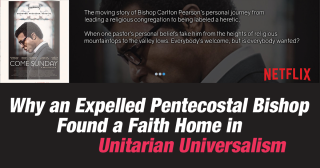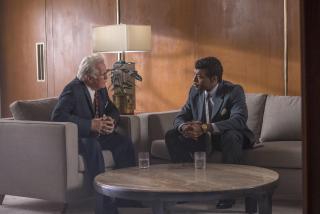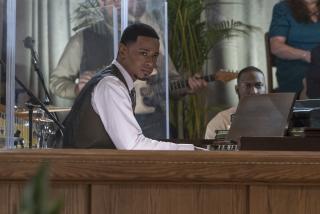Why an Expelled Pentecostal Bishop Found a Faith Home in Unitarian Universalism
Come Sunday, premiering on Netflix April 13, tells the story of how Bishop Carlton Pearson’s epiphany about God’s love cost him his congregation, affiliation with the Joint College of African-American Pentecostal Bishops, and a lot of money, but it only elliptically explains why he found a home for his faithful, and a place to minister and share his message of inclusion, at a Unitarian Universalist church. To understand why Pearson, a prodigy of Oral Roberts and now affiliated with the United Church of Christ (UCC), chose All Souls Unitarian in Tulsa, Oklahoma, you have to know something about how Unitarian Universalism is different from Pentecostalism and other faiths.
After years of success, Bishop Carlton Pearson suffers a crisis of faith when his spiritual reflection leads to conflict with the teachings of his Church. The movie skillfully depicts how much is put at risk by defying religious orthodoxy, and how it is also difficult- if not impossible- to recant spiritual epiphany after it has happened, but it does not explicitly explain that the answer to Pearson’s dilemma is found in the Fourth Principle of Unitarian Universalism.
The Fourth Principle affirms and promotes a “free and responsible search for truth and meaning.” This Unitarian Universalist principle can be criticized as giving UUs a culture of believing in anything, which isn’t true (Read: “Can Unitarian Universalists Really Believe Anything?” by Jennica Davis-Hockett to understand why UUs can’t believe anything they want and still be UU). In fact, the Fourth Principle exists to remind us to engage in the sincere search for spiritual meaning.
Pearson’s crisis of faith is one such Fourth Principle search for spiritual meaning (although he might not have realized that at the time). It is triggered by the pain he feels at the injustice of hundreds of thousands of innocent Tutsis massacred in the Rwandan Genocide* who are condemned to Hell only because they were not Christian when they died. Pearson cannot understand how a loving God would forsake so many innocent souls. Indeed, his crisis deepens as he seeks the answer in the writings of the Bible, ultimately realizing that the Pentecostal interpretation of God’s word as expressed in the Bible no longer makes sense to him. Pearson has a revelation: a loving God would not allow this to happen, a loving God accepts everyone, non-Christians included. In realizing this, Pearson realizes that the Bible supports a Universalist theology, specifically, as Otis Ainsworth Skinner explains, that Universalism is the doctrine that all sinful and alienated human souls—because of divine love and mercy—will ultimately be reconciled to God.[1] Pearson’s spirit is relieved, but there is a problem: his epiphany is considered heresy by his Church. Many faith traditions believe in the concept of heresy (any belief or theory that is strongly at variance with established beliefs or customs, in particular the accepted beliefs of a church or religious organization), while Unitarian Universalism encourages questioning accepted belief when such questioning leads to deeper spiritual truth (read Bart Frost’s post Young Heretics for an explanation of the purpose of this in Unitarian Universalism).
Pearson believes his vision of Theology of Inclusion comes from God, but he is punished when he tries to share it. He is ordered to recant by the elders of his faith. When he doesn’t he is declared a heretic. His white co-pastors at Higher Dimensions Family Church (“Higher-D”) betray the shared vision of creating a racially integrated faith community. When they leave and form a new congregation most of the congregants of Higher-D leave with them. This is a terrible blow to Pearson because Higher-D was a very racially diverse community and exemplified a multicultural vision of Christianity.
In the movie we witness Pearson’s struggle to integrate his new understanding with what he believed as a Pentecostalist. Pearson ultimately affiliates with the United Church of Christ (UCC) in 2006, but leads the remainder of his Higher-D congregation to accept the invitation to merge with the congregation of All Souls Unitarian Church in Tulsa.
So why is it that when Bishop Pearson is expelled from his church he finds religious acceptance, and a home for his faithful (Pearson calls them his, “wilderness wanderers”), in a Unitarian Universalist congregation? This story on UU World explains in detail; Pearson’s quote from the story says a lot, “He (Rev. Marvin Lavanhar) grasped my position on Universalism even more than the UCC folks.”
Carlton Pearson’s religious reflection led him to what he calls the “The Gospel of Inclusion", the idea that if Hell exists it is in the injustices that people perpetrate against one another. Inherent in his Gospel of Inclusion was recognition of the damage done by racism and systemic white supremacy. In 2008 Pearson merged his congregation with All Souls because he saw that racial justice is a central tenet of Unitarian Universalism (evident in both the First Principle, and in the work done by the Unitarian Universalist Association to build Beloved Community and dismantle white supremacy), stating, “...y’all really are interested in this kind of thing, racial justice. We wouldn’t be like boarders or visitors. Y’all would want us there. It would mean a lot to you.”
Telling Carlton Pearson's story, the Netflix movie Come Sunday reveals many things, including the difficulty of growing spiritually, and the difficulty organizations have changing and growing, and lifts up a difference of UUism as compared to other faiths. Come Sunday is an invitation to reflect upon the role faith plays in one’s life, and it is a great example of how following the path of a responsible search for truth and meaning leads to greater purpose, deeper fellowship with others, and spiritual fulfillment. Check out the movie, and as you are watching, consider the following questions:
When was a time you knew deep down in your heart something was true? How did that moment change your actions?
Would you be willing to give up being the star and the benefits that go with fitting in with established belief to follow your heart? What tools would you use to hold onto your faith in the face of opposition?
Carlton Pearson is a highly educated and knowledgeable [1] religious expert when he has his crisis in faith. He challenges his epiphany with what he has been taught to believe. His new found belief survives the test and his faith comes out stronger than before. How is this an example of a Fourth Principle, “responsible search for truth and meaning”?
Although Higher-D is a very racially diverse congregation it is less accepting of diverse identities or sexual orientations. This creates a problem for Pearson in the movie when it is revealed that the music director at Higher-D, a person Pearson cares for deeply, is gay. Why does Pearson’s behavior change toward this person after his epiphany?
Notes:
[1] Otis Ainsworth Skinner (1807–1861), A Series of Sermons in Defence of the Doctrine of Universal Salvation, Page 209, "Repentance is a means by which all men are brought into the enjoyment of religion, and we do not expect any man will be saved while he continues in sin. The reason why we hold to universal salvation, is, we expect all men will repent."
*Learn more about about the Rwandan Genocide here: The Rwandan Genocide - United to End Genocide | Rwandan Genocide - Facts & Summary - HISTORY.com | Rwandan Genocide | 3 Minute History (YouTube)
Visit the All Souls Unitarian Church Tulsa website, and learn more about the ministry of Bishop Pearson.





